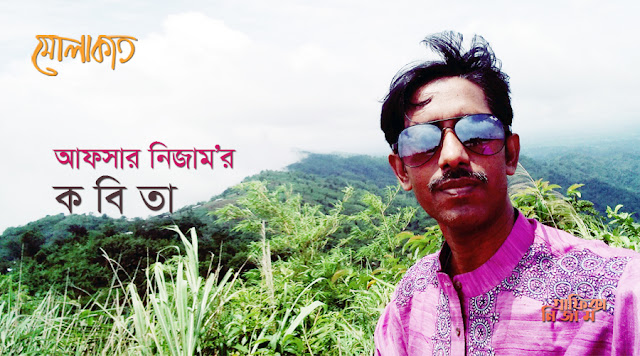Untold and Retold Story on Bangabandhu: Anwarul Karim’s The Ballad of a Patriot_Mohammad Jashim Uddin
The year 2020 is a
remarkable year for Bangladesh as the people celebrate Bangabandhu's centennial
birth anniversary. The Father of the
Nation is an inspiration to the young generation to be a patriot, a real
fighter in establishing humanity on earth, and rebel against all kinds of
crime, sin, and corruption. Until 1996, he was presented in a not so pleasing
manner by the autocratic governments to the second generation after the
bloodshed of 15 August 1975.
Since 2009, the scenario
has changed, and intellectuals have got an open platform to tell Bangabandhu's
truth. Consequently, Dr. Anwarul Karim's The
Ballad of a Patriot: Life and Legacy of Bangabandhu, published in August
2020, is one of the best examples of several untold stories about Bangabandhu.
The book also accommodates some known and settled issues to keep the historical
continuity.
In 1973, he went to Kushtia and encountered some journalists. There the author interviewed him. In a replay to a question, Bangabandhu said that Bangladesh was a small country, and here people were very poor, and it was vital for him to look after their lives. Moreover, he added, "The state does not need any big army in Bangladesh's context."
On the fateful night of the 25 March 1971, Bangabandhu was totally alone. Mysteriously though, some have blamed him for not consulting anything with so and so leaders. History witnesses that Bangabandhu never made any decision emotionally because the writer says, "He was a lone fighter for his people. Sher-e-Bangla and Suhrawardy died in 1962 and 1963, respectively. During Operation Searchlight, Mawlana Bhasani was in India for his safety. Bangabandhu was left alone, and he did not leave his people."
When Bangabandhu delivered his speech at UNO in Bangla, some wanted to say that as he was not good in English, he spoke Bangla, but the truth is that he desired to establish it as an international language as people bravely sacrificed their lives for Bangla, and he was also a part of the language movement. Bangabandhu’s love for the language encouraged him to declare Rabindranath Tagore's "Amar Sonar Bangla" as the National Anthem, and honor Rebel Poet Kazi Nazrul Islam as the National Poet.
The book then portrays Bangabandhu's historical diagram and his struggle in achieving the final goal of independence, which none could imagine before him. According to Dr. Karim, if Bangabandhu were supposed to form the government, things would have been different, but "the corrupt leaders of West Pakistan and the Army Junta did not allow Sheikh Mujib to form the National Government." He thinks it was a blessing for us that Bangabandhu could realize and prepare the people for the battle of 1971, which he declared on 7 March of 1971. It is still now unparalleled and unique in the history of the world.
However, Bangladesh lost her way of looking forward because of Bangabandhu's sudden tragic and murderous death as he was killed along with most of the members of his family by a handful of the soldiers, instigated by the conspirators.
Because of his determination, specific mission, uncompromising attitude against brutality, and true love for his own people, Bangabandhu is compared to Nelson Mandela. Both of them were imprisoned days after days, and finally, they reached their goal, but at the end of the day, Mandela is luckier than Bangabandhu as Mandela died peacefully, whereas Bangabandhu was killed brutally.
Besides, Netaji and Bangabandhu have "points of similarities. Both suffered equally in prisons. Friends and trusted persons betrayed both. Both met deaths following conspiracies." Even the author has not forgotten to mention that Nazrul inspired Bangabandhu. As a result, Nazrul is called the Poet of Rebellion and Bangabandhu as the Poet of Politics.
The book speaks of the legacy of the blood of Bangabandhu and the members of his family. However, it has a strange coincidence and almost a kind of similarity with an unknown Victorian fighter in England. Robert Browning, the Victorian poet, immortalized him in his poem. In the poem, "The Protagonist, the Patriot himself, speaks in the dramatic monologue that he fought and earned freedom for his people and they arranged a rousing reception for him, but after a year it was they who misjudged him for reasons unknown and killed him on a false plea by hanging."
However, a few other things corroborate a little with things related to the Patriot of Browning and Bangabandhu as well, such as the love of his people; and the heroic and rousing reception accorded to him by his countrymen after he returned home. Bangabandhu was then working for rebuilding the war-torn country late at night. He was scheduled to deliver a lecturer before the teachers, students, and employees of the university and exchange views with them at the TSC. Unfortunately, he could not finish the task because few bullets destroyed everything.
The book contains fifteen different chapters, excluding 'Introduction' and ‘Biography,' and every chapter has new information. Without reading, one cannot imagine how informative and worthy the book is.
The young generation should go through the book as Phil Parshall remarks that "His (Bangabandhu) biography is a 'must-read" especially for the youth of Bangladesh who did not have the privilege of personally engaging with the Bangabandhu of 1971."
The review is an
assistant professor of English at Northern University Bangladesh. He can be
reached at jashimnub@yahoo.com
In 1973, he went to Kushtia and encountered some journalists. There the author interviewed him. In a replay to a question, Bangabandhu said that Bangladesh was a small country, and here people were very poor, and it was vital for him to look after their lives. Moreover, he added, "The state does not need any big army in Bangladesh's context."
On the fateful night of the 25 March 1971, Bangabandhu was totally alone. Mysteriously though, some have blamed him for not consulting anything with so and so leaders. History witnesses that Bangabandhu never made any decision emotionally because the writer says, "He was a lone fighter for his people. Sher-e-Bangla and Suhrawardy died in 1962 and 1963, respectively. During Operation Searchlight, Mawlana Bhasani was in India for his safety. Bangabandhu was left alone, and he did not leave his people."
When Bangabandhu delivered his speech at UNO in Bangla, some wanted to say that as he was not good in English, he spoke Bangla, but the truth is that he desired to establish it as an international language as people bravely sacrificed their lives for Bangla, and he was also a part of the language movement. Bangabandhu’s love for the language encouraged him to declare Rabindranath Tagore's "Amar Sonar Bangla" as the National Anthem, and honor Rebel Poet Kazi Nazrul Islam as the National Poet.
The book then portrays Bangabandhu's historical diagram and his struggle in achieving the final goal of independence, which none could imagine before him. According to Dr. Karim, if Bangabandhu were supposed to form the government, things would have been different, but "the corrupt leaders of West Pakistan and the Army Junta did not allow Sheikh Mujib to form the National Government." He thinks it was a blessing for us that Bangabandhu could realize and prepare the people for the battle of 1971, which he declared on 7 March of 1971. It is still now unparalleled and unique in the history of the world.
However, Bangladesh lost her way of looking forward because of Bangabandhu's sudden tragic and murderous death as he was killed along with most of the members of his family by a handful of the soldiers, instigated by the conspirators.
Because of his determination, specific mission, uncompromising attitude against brutality, and true love for his own people, Bangabandhu is compared to Nelson Mandela. Both of them were imprisoned days after days, and finally, they reached their goal, but at the end of the day, Mandela is luckier than Bangabandhu as Mandela died peacefully, whereas Bangabandhu was killed brutally.
Besides, Netaji and Bangabandhu have "points of similarities. Both suffered equally in prisons. Friends and trusted persons betrayed both. Both met deaths following conspiracies." Even the author has not forgotten to mention that Nazrul inspired Bangabandhu. As a result, Nazrul is called the Poet of Rebellion and Bangabandhu as the Poet of Politics.
The book speaks of the legacy of the blood of Bangabandhu and the members of his family. However, it has a strange coincidence and almost a kind of similarity with an unknown Victorian fighter in England. Robert Browning, the Victorian poet, immortalized him in his poem. In the poem, "The Protagonist, the Patriot himself, speaks in the dramatic monologue that he fought and earned freedom for his people and they arranged a rousing reception for him, but after a year it was they who misjudged him for reasons unknown and killed him on a false plea by hanging."
However, a few other things corroborate a little with things related to the Patriot of Browning and Bangabandhu as well, such as the love of his people; and the heroic and rousing reception accorded to him by his countrymen after he returned home. Bangabandhu was then working for rebuilding the war-torn country late at night. He was scheduled to deliver a lecturer before the teachers, students, and employees of the university and exchange views with them at the TSC. Unfortunately, he could not finish the task because few bullets destroyed everything.
The book contains fifteen different chapters, excluding 'Introduction' and ‘Biography,' and every chapter has new information. Without reading, one cannot imagine how informative and worthy the book is.
The young generation should go through the book as Phil Parshall remarks that "His (Bangabandhu) biography is a 'must-read" especially for the youth of Bangladesh who did not have the privilege of personally engaging with the Bangabandhu of 1971."
⭐ FOR ANY HELP PLEASE JOIN
🔗 MY OTHERS CHANNELS
🔗 FOLLOW ME
Facebook: facebook.com/molakat
Facebook: facebook.com/afsarnizam
Instagram: instagram.com/molakat
Instagram: instagram.com/afsarnizam
Twitter: twitter.com/afsarnizam
🔗 MY WEBSITE
🔗 CALL ME
+8801819515141
🔗 E-MAILL
molakatmagazine@gmail.com











No comments